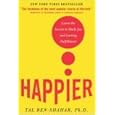 I admit that I've never been a fan of psychological self-help books: the kinds that promise true happiness and/or eternal salvation through meditation or self-hypnosis or the teachings of a particular philosopher or religious leader-or a politician, for that matter. I am an admitted cynic and skeptic.
I admit that I've never been a fan of psychological self-help books: the kinds that promise true happiness and/or eternal salvation through meditation or self-hypnosis or the teachings of a particular philosopher or religious leader-or a politician, for that matter. I am an admitted cynic and skeptic.That said, I often encounter reviews of books probably not interesting or relevant enough to make me get out my credit card, but containing a few ideas that start me thinking.
Heidi Stevens' article, "Your assignment: Be happier" in the September 2 Chicago Tribune, is about Happier, a book by Harvard University Professor Tal Ben-Shahar.
According to Ben-Shahar, happiness eludes hedonists, who just enjoy the present with no thought for the future; rat racers, who suffer now in the hope of future happiness; and nihilists, who have no joy or belief in happiness, either present or future. True happiness requires both pleasure and meaning in your life. "Identifying the right activity, and then the right quantity for each activity, leads to the highest quality of life."
Apparently this book reviews several things I have already learned in my long life:
Money doesn't buy happiness. Psychologist Philip Brickman discovered that big lottery winners return to their original happiness levels within a month.
It takes courage to leave one's comfort zone to find happiness, as in leaving a hated high-paying job for less money and more satisfaction.
Helping others is one of the components of a happy life.
I like this exercise from the book, especially for those considerably younger than I: "Imagine yourself at 110 years old, offering advice to your current self. Would you tell yourself to spend more time with your family? Find a more fulfilling career?" That's good advice, especially for what I assume to be the book's primary intended audience, today's college students and recent graduates.
I consider myself about as happy as an elderly, imperfect person in an imperfect world can be, but I've encountered many unhappy people of all ages. This book might help them, especially anyone admitting to being a hedonist, a rat racer, or a nihilist. Anyway, regardless of age, you surely can't go wrong by de-emphasizing money, daring to leave your comfort zone, and helping others.
Copyright 2007 by Marlys Marshall Styne


















5 comments:
I understand this philosophy completely. I have done all of the above and will probably do so again because I'm still not where I want to be. Where that is, I'm not sure. I'll know when I get there and I'll keep trying until I do.
I heard about this book recently and really want to get my hands on a copy. Hubby and I attended lectures on "happiness" and it's a fascinating subject; we think we've done pretty good job of it so far, and like you, have discovered those 3 things you listed. By the way, I finally found your blog. Can't imagine why it took me so long, but I'll be back to catch up as time permits.
Thanks, Kay and Alice. Please keep coming back to my blog and commenting.
Marlys, congratulations on making Ronni Bennett's elder blogroll. I figured it was imminent, since you're such a good writer, and Ronni is so savvy!
Thanks for the kind words!
Post a Comment